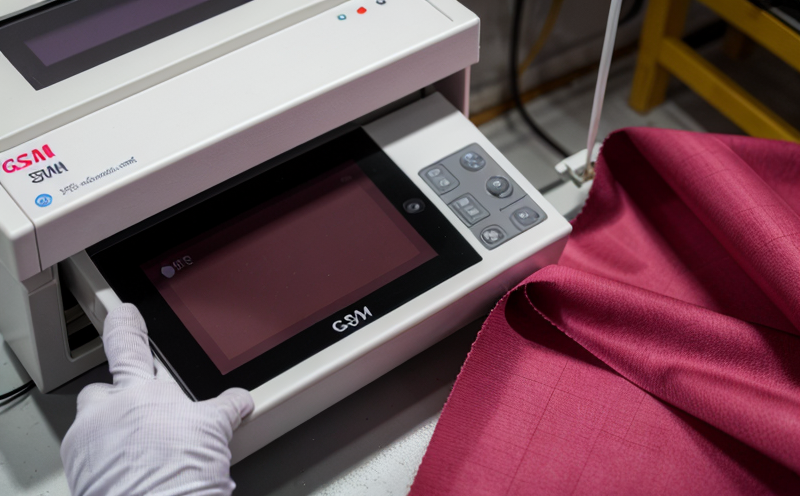NF EN ISO 3801 Détermination de la Masse par Unité de Surface des Étoffes
The NF EN ISO 3801 standard, entitled "Determination of the Mass per Unit Area of Fabrics," is a crucial method used in textile testing to measure and report on the mass per unit area of fabrics. This parameter provides essential information about the weight distribution across the surface of textiles, which can significantly impact a fabric's performance characteristics such as durability, comfort, and cost-effectiveness.
The measurement of GSM (grams per square meter) is fundamental in various industries where textile quality control and material specifications are critical. For instance, in the fashion industry, it helps ensure that garments meet specific weight requirements for different styles or sizes. In home textiles like carpets, it ensures consistent quality across products. Additionally, this standard plays a significant role in medical and industrial fabrics, where precise material specifications can affect safety and performance.
The test procedure involves cutting an accurately defined specimen from the fabric and then weighing it after drying to ensure that any moisture content does not influence the results. The weight is measured in grams, while the area of the cut-out piece is measured in square meters. The result is expressed as grams per square meter (GSM).
The precision required for this test cannot be overstated. Small variations in cutting and handling can lead to significant discrepancies in the final measurement. Therefore, strict adherence to the ISO 3801 standard ensures accurate and consistent results.
- Specimens should be cut from a minimum of five different areas within the fabric to ensure an average value that represents the entire batch.
- Environmental conditions must be controlled during the drying process to avoid any moisture-related errors.
This standard is widely used in industries such as fashion, home textiles, automotive interiors, and medical supplies. It provides a reliable method for textile manufacturers and suppliers to communicate material specifications accurately with their clients or regulatory bodies.
The importance of this test lies in its ability to influence numerous aspects of the product lifecycle, from initial design through production and quality control right up to end-user satisfaction. Understanding GSM values is crucial for optimizing fabric usage, managing costs effectively, and ensuring compliance with international standards.
EuroLab Advantages
At EuroLab, we pride ourselves on delivering top-tier textile testing services that are not only compliant with NF EN ISO 3801 but also exceed industry expectations. Our state-of-the-art facilities and experienced team ensure accurate, reliable, and timely results every time.
- Precision Equipment: We use high-precision balance scales and measuring devices to guarantee precise measurements of the fabric samples.
- Consistent Environment: Our controlled environment ensures that all tests are conducted under standard conditions, minimizing variables that could affect results.
- Expertise: Our team comprises highly skilled technicians with extensive experience in textile testing, ensuring thorough and accurate assessments.
We offer rapid turnaround times without compromising on the quality of our services. Our commitment to excellence ensures that you receive reliable data when it matters most. Whether you need periodic checks or one-off tests, we are here to support your needs efficiently and effectively.
Why Choose This Test
- To ensure compliance with international standards for fabric quality.
- To provide consistent product specifications across different batches or suppliers.
- To optimize material usage by understanding the exact weight requirements of fabrics.
- To enhance end-user satisfaction by delivering products that meet expected quality levels.
The determination of GSM is essential in various industries where precise fabric specifications are critical. For example, in fashion design, knowing the GSM allows for accurate prediction of material consumption and cost estimation. In medical textiles, it ensures that the materials used are safe and effective. In automotive interiors, it helps in selecting fabrics that meet both aesthetic and functional requirements.
By choosing this test, you ensure that your products are manufactured consistently and to high standards, which is vital for maintaining a strong reputation in the market. It also aids in identifying potential issues early in the production process, allowing for corrective actions before they become significant problems.
Customer Impact and Satisfaction
The results of NF EN ISO 3801 tests have a direct impact on customer satisfaction by ensuring that products meet or exceed expectations. For consumers, this means purchasing items that are durable, comfortable, and cost-effective based on their needs.
- Durability: Higher GSM fabrics generally offer better durability, which is crucial for long-lasting products like carpets or upholstery.
- Comfort: Understanding the GSM helps in selecting materials that provide optimal comfort, such as in bed linens or clothing.
- Cost-Effectiveness: Knowing the exact weight requirements allows manufacturers to optimize material usage and reduce costs without compromising quality.
In industries like home textiles, medical supplies, and automotive interiors, compliance with this standard is not just about meeting regulations but also about delivering products that are safe, effective, and meet customer expectations. By choosing EuroLab for your textile testing needs, you ensure that all these factors are considered comprehensively.





